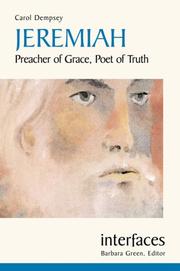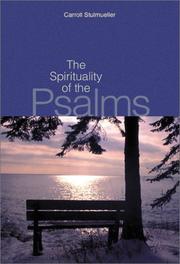| Listing 1 - 10 of 14 | << page >> |
Sort by
|
Book
ISBN: 0827217188 9780827217188 Year: 2008 Publisher: St. Louis: Chalice Press,
Abstract | Keywords | Export | Availability | Bookmark
 Loading...
Loading...Choose an application
- Reference Manager
- EndNote
- RefWorks (Direct export to RefWorks)

ISBN: 9780814659854 0814659853 Year: 2006 Publisher: Collegeville: Liturgical press,
Abstract | Keywords | Export | Availability | Bookmark
 Loading...
Loading...Choose an application
- Reference Manager
- EndNote
- RefWorks (Direct export to RefWorks)
Book
ISBN: 1299316921 1589837029 9781589837027 1589837010 9781589837010 9781589837959 1589837959 Year: 2012 Publisher: Atlanta
Abstract | Keywords | Export | Availability | Bookmark
 Loading...
Loading...Choose an application
- Reference Manager
- EndNote
- RefWorks (Direct export to RefWorks)
Jerusalem in the Bible. --- Personification in the Bible. --- Jerusalem in the Bible --- Mandolfo, Carleen. --- Bible. --- Ekhah (Book of the Old Testament) --- Eremiya aika (Book of the Old Testament) --- Klagelieder (Book of the Old Testament) --- Lamentations (Book of the Old Testament) --- Megilat Ekhah --- Threni (Book of the Old Testament) --- Criticism, interpretation, etc. --- Jerusalem --- In the Bible.
Book
ISBN: 0814681883 9780814681886 9780814681633 0814681638 Year: 2015 Publisher: Collegeville, Minnesota Liturgical Press
Abstract | Keywords | Export | Availability | Bookmark
 Loading...
Loading...Choose an application
- Reference Manager
- EndNote
- RefWorks (Direct export to RefWorks)
Reading Haggai and Malachi in conversation with feminist theory, rhetorical criticism, and masculinity studies reveals two communities in different degrees of crisis. The prophet Haggai successfully persuades a financially strapped people to rebuild the temple, but the speaker in Malachi faces sustained resistance to his arguments in favor of maintaining the priestly hierarchy. Both books describe conflicts among men based upon social class, and those who claim to speak for God find their claims and, with them, God’s presumably unquestionable authority as the ultimate male contested.
Bible. --- Malachi (Book of the Old Testament) --- Malachias (Book of the Old Testament) --- Maleachi (Book of the Old Testament) --- Aga (Book of the Old Testament) --- Aggeus (Book of the Old Testament) --- Haggai (Book of the Old Testament) --- 224.97 --- 224.99 --- 224.97 Aggeüs --- Aggeüs --- 224.99 Malachia --- Malachia --- Bible --- Feminist criticism.
Book
ISBN: 0814681867 9780814681862 9780814681619 0814681611 Year: 2015 Publisher: Collegeville, Minnesota Liturgical Press
Abstract | Keywords | Export | Availability | Bookmark
 Loading...
Loading...Choose an application
- Reference Manager
- EndNote
- RefWorks (Direct export to RefWorks)
This volume brings gender studies to bear on Micah's powerful rhetoric, interpreting the book within its ancient and modern contexts. Julia M. O'Brien traces resonances of Micah's language within the Persian Period community in which the book was composed, evaluating recent study of the period and the dynamics of power reflected in ancient sources. Also sampling the books reception by diverse readers in various time periods, she considers the real-life implications of Micah's gender constructs. By bringing the ancient and modern contexts of Micah into view, the volume encourages readers to reflect on the significance of Micah's construction of the world. Micah's perspective on sin, salvation, the human condition, and the nature of YHWH affects the way people live -- in part by shaping their own thought and in part by shaping the power structures in which they live. O'Brien's engagement with Micah invites readers to discern in community their own hopes and dreams: What is justice? What should the future look like? What should we hope for?
Bible. --- Micah (Book of the Old Testament) --- Micheas (Book of the Old Testament) --- Mikhah (Book of the Old Testament) --- Miqueas (Book of the Old Testament) --- 224.93 --- 224.93 Michea --- Michea --- Christian life. --- Christian life --- Christians --- Discipleship --- Religious life --- Theology, Practical --- Christianity
Book
ISBN: 9780814681558 0814681557 9780814681800 Year: 2016 Publisher: Collegeville, Minnesota Liturgical Press
Abstract | Keywords | Export | Availability | Bookmark
 Loading...
Loading...Choose an application
- Reference Manager
- EndNote
- RefWorks (Direct export to RefWorks)
Baruch and the Letter of Jeremiah are among the so-called deuterocanonical books of the Bible, part of the larger Catholic biblical canon. Except for a short article in the Women's Bible Commentary, no detailed or comprehensive feminist commentary on these books is available so far. Marie-heres Wacker reads both books with an approach that is sensitive to gender and identity issues. The book of Baruch -- with its reflections on guilt of the fathers, with its transformation of wisdom into the Book of God's commandments, and with its strong symbol of mother and queen Jerusalem -- offers a new and creative digest of Torah, writings, and prophets but seems to address primarily learned men. The so-called Letter of Jeremiah is an impressive document that unmasks pseudo-deities but at the same draws sharp lines between the group's identity and the "others," using women of the "others" as boundary markers.
229*215 --- 229*215 III Baruch. Paralipomena Jeremiae --- III Baruch. Paralipomena Jeremiae --- Bible. --- Epistle of Jeremiah --- Letter of Jeremiah --- Jeremiah, Epistle of --- Baruch (Book of the Apocrypha) --- Buch Baruch --- First Baruch (Book of the Apocrypha) --- Book of Baruch
Book
ISBN: 9780814681541 0814681549 9780814681794 Year: 2017 Publisher: Collegeville, Minnesota Liturgical Press
Abstract | Keywords | Export | Availability | Bookmark
 Loading...
Loading...Choose an application
- Reference Manager
- EndNote
- RefWorks (Direct export to RefWorks)
Though the five poems of Lamentations undoubtedly refer to the Babylonian siege and destruction of Jerusalem in 587 BCE, the multiple voices that narrate unspeakable suffering and labor to make sense of the surrounding horror do so at women's expense.In the opening chapters, a prevailing metaphor of Jerusalem as a woman (Woman Zion) portrays a weeping widow, abandoned and alone, who soon becomes the target of blame for the downfall of the city and its inhabitants. Vague sexual improprieties craft the basis of her sinfulness, seemingly to justify her immense suffering as punishment. The damning effect of such a metaphor finds company in subsequent accounts of women, young girls, and mothers-all victims of the destruction recorded therein. But this feminist interpretation of Lamentations does not stop at merely documenting the case against women; it also demonstrates how such texts can serve as sources of strength by lifting up portraits of courageous resistance amid the rubble of misogynist landscapes.
224.3 --- 224.3 Jeremias. Lamentationes. Klaagliederen --- 224.3 Jeremie. Lamentations de Jeremie --- Jeremias. Lamentationes. Klaagliederen --- Jeremie. Lamentations de Jeremie --- Catholic Church --- Doctrines. --- Bible. --- Ekhah (Book of the Old Testament) --- Eremiya aika (Book of the Old Testament) --- Klagelieder (Book of the Old Testament) --- Lamentations (Book of the Old Testament) --- Megilat Ekhah --- Threni (Book of the Old Testament) --- Church of Rome --- Roman Catholic Church --- Katholische Kirche --- Katolyt︠s︡ʹka t︠s︡erkva --- Römisch-Katholische Kirche --- Römische Kirche --- Ecclesia Catholica --- Eglise catholique --- Eglise catholique-romaine --- Katolicheskai︠a︡ t︠s︡erkovʹ --- Chiesa cattolica --- Iglesia Católica --- Kościół Katolicki --- Katolicki Kościół --- Kościół Rzymskokatolicki --- Nihon Katorikku Kyōkai --- Katholikē Ekklēsia --- Gereja Katolik --- Kenesiyah ha-Ḳatolit --- Kanisa Katoliki --- כנסיה הקתולית --- כנסייה הקתולית --- 가톨릭교 --- 천주교
Book
ISBN: 9780814681626 081468162X 9780814681879 Year: 2017 Publisher: Collegeville, Minnesota Liturgical Press
Abstract | Keywords | Export | Availability | Bookmark
 Loading...
Loading...Choose an application
- Reference Manager
- EndNote
- RefWorks (Direct export to RefWorks)
This volume offers a womanist and feminist analysis of the books of Nahum, Habakkuk, and Zephaniah, attending to translation and textual issues, use of power and agency, and constructions of gender and its significance for the real and metaphorical women in the texts. The unit on Nahum takes an unflinching look at God's role and rhetoric in the rape of Nineveh and considers implications for the women of Nineveh and Israel and for contemporary readers. Habakkuk is read employing a womanist stratagem, talking back to God. The section on Zephaniah explores the racialized history of interpreting "Cushi" in Zephaniah's genealogy and the figures of Daughter Zion/Jerusalem. The commentary also assesses these texts as scriptures of synagogue and church, their use and utility. A Jewish feminist reading and womanist hermeneutic accompanies each biblical book.
224.94 --- 224.95 --- 224.96 --- 224.96 Sophonia. Zephaniah --- Sophonia. Zephaniah --- 224.95 Habakuk --- Habakuk --- 224.94 Nahum --- Nahum --- Bible. --- Nahum (Book of the Old Testament) --- Sofonia (Book of the Bible) --- Zefanja (Book of the Bible) --- Zephaniah (Book of the Bible) --- Habakkuk (Book of the Old Testament) --- Ḥavaḳuḳ (Book of the Old Testament) --- Feminist criticism.
Book
ISBN: 9780567408488 9780567418081 Year: 2014 Publisher: London Bloomsbury
Abstract | Keywords | Export | Availability | Bookmark
 Loading...
Loading...Choose an application
- Reference Manager
- EndNote
- RefWorks (Direct export to RefWorks)
Laments in the Bible --- Elegiac poetry, Hebrew --- Jewish religious poetry, Hebrew --- History and criticism

ISBN: 0814625991 Year: 2002 Publisher: Collegeville Liturgical Press
Abstract | Keywords | Export | Availability | Bookmark
 Loading...
Loading...Choose an application
- Reference Manager
- EndNote
- RefWorks (Direct export to RefWorks)
| Listing 1 - 10 of 14 | << page >> |
Sort by
|

 Search
Search Feedback
Feedback About UniCat
About UniCat  Help
Help News
News